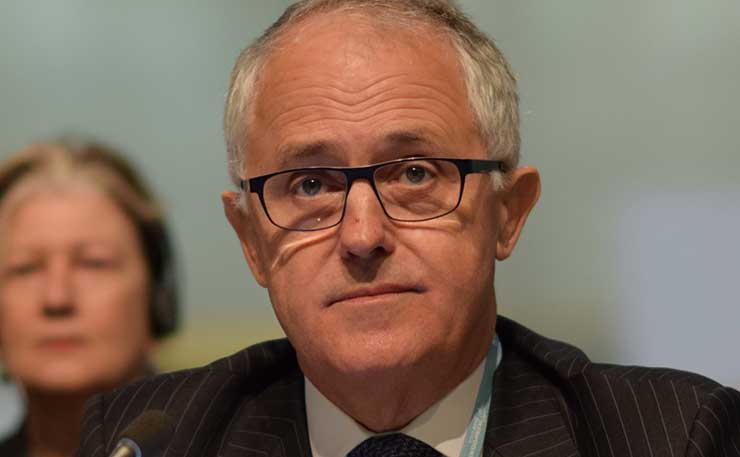The Prime Minister appears to have inherited (and embraced) more than just the toxic policies of his predecessor, writes Michael Brull.
Not all that long ago, Malcolm Turnbull was the Leader of the Opposition and facing a dauntingly formidable Prime Minister. Elected in 2007, ABC journalist Barrie Cassidy noted that Kevin Rudd had “achieved the highest approval rating of any prime minister ever”.
In April 2009, Rudd’s lead over Turnbull seemed unassailable. Struggling to gain traction in a traditional area of right-wing support, Turnbull turned to exploit the issue of asylum seekers.
The story was told in a cable from the US embassy in Canberra, sent to the US Secretary of State. It observed that the latest Newspoll “showed the Rudd government maintaining its 58/42 lead over the Opposition; virtually no change to Rudd’s high approval rating; and virtually no change to Rudd’s massive lead over Turnbull as preferred Prime Minister.”
A subheading that followed read: “LIFELINE FOR DESPERATE TURNBULL”. It explained that “Turnbull, a social Liberal, doesn’t appear comfortable pursuing this issue, but is way behind in the polls and needs an issue to try to erode Rudd’s formidable poll numbers.”
Turnbull was claiming that Australia’s policies were too “receptive” and “accommodating” for people who arrive by boat, thus encouraging asylum seekers. Turnbull urged the re-introduction of Temporary Protection Visas.
The cable noted that this “was an issue that worked for Howard in 2001. It drove a wedge between the ALP’s ‘working families’ and its middle-class Left constituencies. However, working against Turnbull is that national security as a major issue has declined in relation to economic concerns, and the ALP has the resources of government to demonstrate it is working to address the problem.”
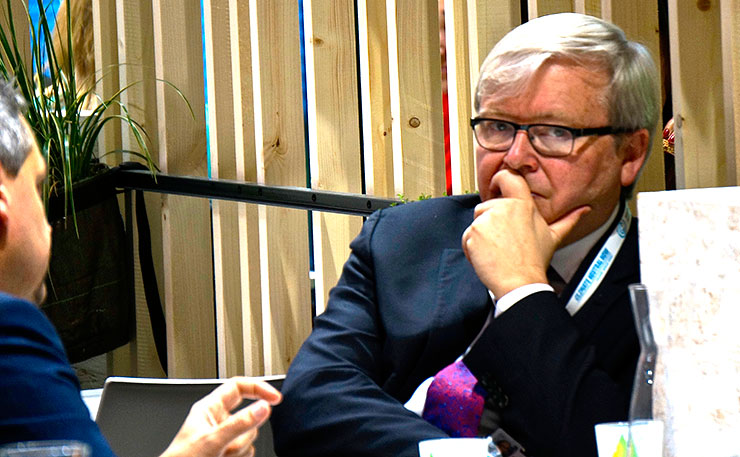
Only 40 per cent opposed the government’s policies, and 57 per cent “believed tighter immigration laws would make no difference to the number of asylum seekers seeking to enter Australia”.
Turnbull may have been reluctant. But he was desperate, and history showed that dog-whistles and fear-mongering could increase his support. So Turnbull ramped up the anti-asylum seeker rhetoric.
At the time, it didn’t get him very far. By the end of the year, he had been overthrown by Tony Abbott.
Turnbull’s desperate position
Fast forward seven years, and Malcolm Turnbull is Prime Minister, and once again, desperate.
For the last three Newspolls, the two party preferred vote has been 52 per cent for the ALP, 48 per cent for the Coalition. Turnbull’s net satisfaction rating has plunged from 38 per cent positive in November last year, to a dreadful 28 per cent negative. The Australian reports that his popularity is comparable to that of Abbott when he was overthrown in September last year. Julia Gillard and Tony Abbott both reached worse levels of net negative satisfaction ratings (45 and 44 per cent, respectively). Yet this can come as little consolation to Turnbull. He is in deep trouble, and he knows it.
When Turnbull overthrew Abbott, he must have felt as though he had waited forever for his moment to strike. Abbott’s popularity had started plunging from the start of his prime ministership, and ranged from the poor to the dreadful.
Turnbull waited two long years, and made sure he had the numbers before he made his move. Yet in doing so, he forced himself into the corner that now traps him.
Leading a party more socially conservative than him, Turnbull made so many concessions to his colleagues that he lost the ability to distinguish himself from Abbott. Instead of forcing his colleagues to embrace a more progressive brand of Liberalism, he made his way to power by assuring his colleagues that the only change would be who was running the Coalition. Otherwise, they would have their cake and eat it too: a more popular face to the same Liberal policies.
Yet the reason Turnbull was more popular than Abbott was because he was considered different. The public has learned that we were wrong, and Turnbull’s colleagues were right. There was no change on offer. Having inherited Abbott’s policies, Turnbull is now inheriting his unpopularity.
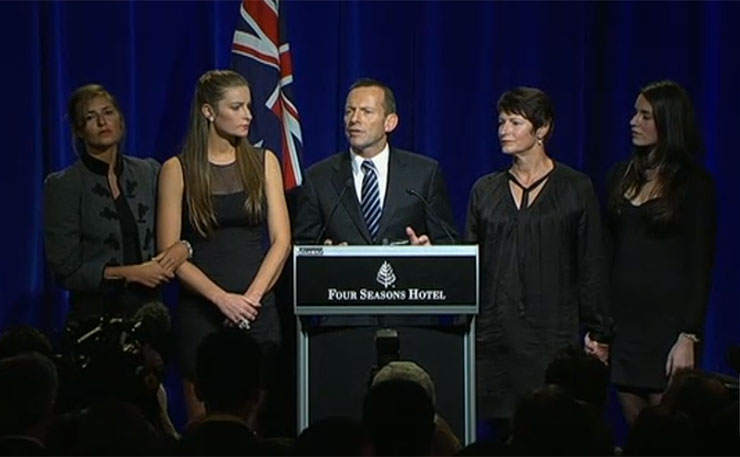
As it stands, the Turnbull government doesn’t seem to have any real agenda, and is constantly held hostage by its more right-wing elements.
There is little support or interest in re-establishing the ABCC. Turnbull’s desperate struggle to maintain dominance within the party leaves him no room to discipline misbehaving colleagues, such as the egregious Attorney-General George Brandis.
With a razor-thin majority, Turnbull has to keep all of his colleagues onside. Such as George Christensen, who has openly confronted Turnbull in September this year over a backpacker tax, and in February this year over the Safe Schools program. By March, Turnbull caved in to Christensen, showing the grip the conservatives have over the government.
Turnbull is also battling constant undermining by Abbott. Abbott seems to harbour the fantasy that he will one day return as Prime Minister, his polices and legacy vindicated.
As unpopular as Turnbull gets, the one constant with the internal topplings of Rudd, Gillard and Abbott, is that all of them were overthrown by politicians who offered the prospect of improved popularity.
Gillard had a brief honeymoon, Rudd was mildly positive by the time he overthrew the wildly-hated Gillard, and Turnbull was popular for months. Abbott, on the other hand, is not very popular, and never really has been.
An Australia Institute poll in April found that some 63 per cent of Australians want Abbott to retire. Polls by Essential found that 47 per cent in March, and 49 per cent in December, wanted Abbott to retire. Returning Abbott to power may please the Liberal base, right-wing bloggers, and some voters who have defected to One Nation, but it is unlikely to address the Coalition’s declining political support.
Yet if overthrowing Turnbull isn’t on the cards for Abbott, he can still destabilise the party in other ways.
Given his weakness in the party, and with the public, Turnbull will presumably be tempted to reach for a similar lifeline to the one he pursued in 2009. There are already signs of his new approach.
In September, Turnbull announced that we would be taking in refugees from Costa Rica. Andrew Bolt observed “How convenient. They are Catholics there, aren’t they? They sure aren’t Muslim.”
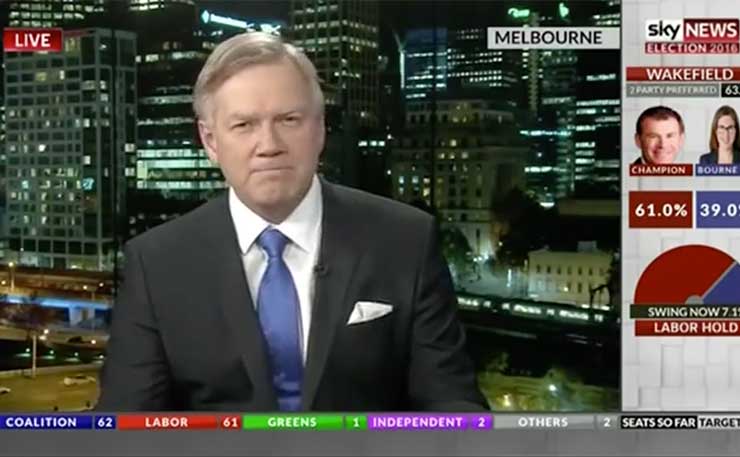
Bolt commented that this was “good news for Hanson voters… more Catholics, fewer Muslims.” Turnbull “didn’t put it like that on Wednesday, of course. He doesn’t want to be called racist.”
Then Greg Sheridan in the Australian weighed in that refugees Australia took in from Syria would mostly be Christian. According to Sheridan, “Much of the non-Christian remainder will be from other persecuted, non-Muslim minorities, including Yazidis, Druze and Zoroastrians. The Sunni Muslims who are included will comprise in part of Kurds, fierce opponents of Islamist extremism”.
Turnbull didn’t say that we would stop taking in Muslims. But he got word out that we would now take in fewer Muslims, and few Muslim refugees.
Then he escalated his rhetoric, this time in defence of his lawless Attorney-General.
The Attorney-General who thinks he’s above the law
The issue in question, involving part of the skirmish between the Solicitor General and Attorney general, may sound dry. But it is important, and worth understanding.
In brief, Attorney-General George Brandis claimed that Solicitor-General Justin Gleeson was consulted on legislation on changes to the citizenship laws, and found it constitutionally valid. Gleeson basically said this was false.
Gleeson argued in a letter attached in a Senate submission that he had provided advice on an earlier version of the bill in August 2014. His advice was initially not sought on later “significantly revised” versions. “Almost by accident”, Gleeson learned of the new bill, and Gleeson gave some sort of advice in June 2015, which is redacted. It may be that he found that the bill was unconstitutional.
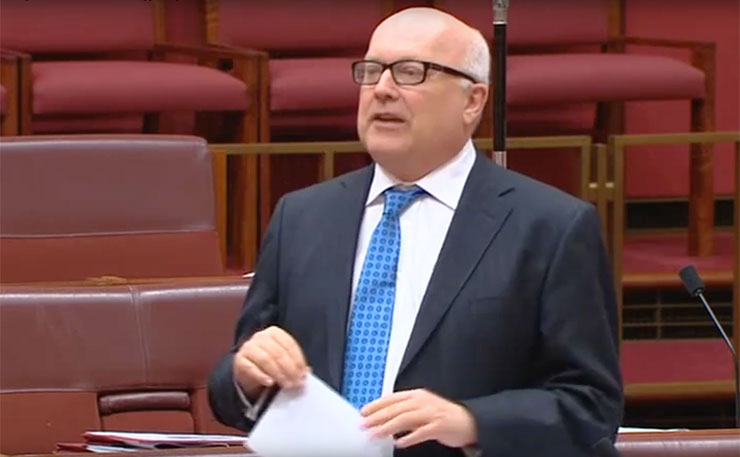
Gleeson then gave then an “urgent” advice “under acute time constraints”. The bill was revised again, and then introduced a day later into Parliament, without Gleeson’s advice.
Brandis wrote to Shadow Attorney-General Mark Dreyfus, claiming that Gleeson had advised that it was likely the High Court would uphold the draft bill. Dreyfus reproduced this letter in a tweet: Brandis assured Dreyfus that “the Government has received advice from the Solicitor-General, Mr Justin Gleeson SC, that, in his opinion, there is a good prospect that a majority of the High Court would reject a constitutional challenge to the core aspects of the draft Bill.”
Brandis’ statement about Gleeson’s advice was introduced to Parliament, in the form of an appendix to an Advisory Report of a Joint Committee.
Gleeson’s wording in his letter to Brandis is carefully worded. Commenting instead on Turnbull saying that the government had received advice that the laws would be upheld in the High Court, Gleeson says if those statements are understood as saying that he had “advised on the current Bill, and about the content of that advice”, that understanding would be “inaccurate”.
It is possible that there is some kind of legalistic loop-hole that Gleeson has created. Otherwise, it is hard to avoid the conclusion that Gleeson is accusing Brandis of misrepresenting his advice. And in a dispute between Gleeson and Brandis, it is hard not to instantly believe Gleeson.
Thus, it seems almost certain that Brandis has misled Parliament. Not only that: he has misled Parliament to prevent legal scrutiny of his own legislation. That is scandalous.
The point of the Constitution is to ensure that the government acts within the limits of the law. The Solicitor General is supposed to be an independent office which performs independent legal analysis. The government thus has an institution it can consult to ensure its actions are lawful.
Brandis apparently regards himself as above the law. He is not merely unconcerned with acting within the confines of the law. He has also acted to stop other politicians from accessing independent legal advice from the Solicitor General, and thus know what the law is. Brandis’s behaviour has been utterly appalling, and he should be fired.
Turnbull escalates his rhetoric
On 17 October, the Shadow Attorney-General Mark Dreyfus asked Turnbull if the government would act under the same legislation “where a letter the Attorney-General provided to the Joint Committee on Intelligence and Security incorrectly represented advice from the Solicitor-General”.
Turnbull escalated his rhetoric. Politically cornered, Turnbull used the kind of language we know from the Abbott years: “What the shadow Attorney-General is now doing is taking his feud with the Attorney-General into an area where he is putting our national security at risk.”
Whilst Dreyfus may disagree with Brandis, the “responsible” thing to do would be to raise the issue in the committee, and thus “put our safety first”.
Dreyfus tried again. Were there risks to Australia if the law was successfully legally challenged? Why did the government misrepresent the advice of the Solicitor-General? Turnbull replied that “We are dealing with very serious security issues. The risk and threat of terrorism that we face is greater than ever.” The government needs “the legislative tools to ensure that they can keep us safe.” If Dreyfus “has real concerns, he has to get over these petty personal animosities and get on our team, get on Australia’s team, to ensure that we have the right legislation.”
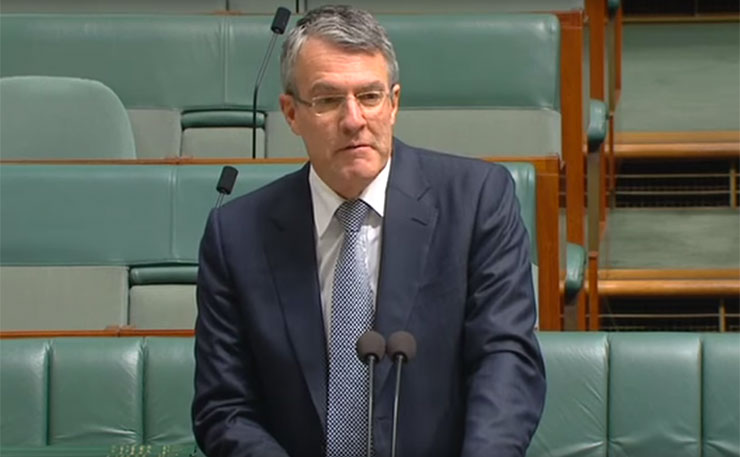
The issues Drefyus raised were about Brandis misleading parliament, and preventing legal scrutiny of his own bill to see if it is lawful. Turnbull responded by implying that Dreyfus isn’t “on Australia’s team”, doesn’t have “real concerns” about these issues, and needs the threat of terrorism explained to him.
The problem is not just that the Coalition is pushing draconian laws that will curtail civil liberties. It is not just the obscene fact that the Attorney-General is acting lawlessly. It is that Turnbull is conflating reservations about the government’s laws, and the Attorney-General’s behaviour, with a kind of treachery.
This kind of smearing shuts down debate and poisons public discourse. More troublingly, it disproportionately demonises other sceptics of the government’s counter-terrorism policies, who don’t have the same power and influence as Dreyfus.
That language of treachery, of those who aren’t on Australia’s team, will trickle down to greater suspicion towards others who share his concerns, above all Muslims.
In 2009, the US cable observed desperate Turnbull, behind in the polls, reaching for a lifeline. Turnbull is once again desperate, behind in the polls, and reaching for a lifeline.
He is pushing harsh laws to curtail civil liberties, restricting the immigration of Muslim refugees, and escalating his dog-whistles.
Regardless of whether it improves his standing, these policies are harmful. Whatever time Turnbull has left, he is ensuring he will leave a toxic legacy of scapegoating and bigotry, much like the Prime Minister he overthrew.
Donate To New Matilda
New Matilda is a small, independent media outlet. We survive through reader contributions, and never losing a lawsuit. If you got something from this article, giving something back helps us to continue speaking truth to power. Every little bit counts.

